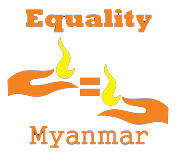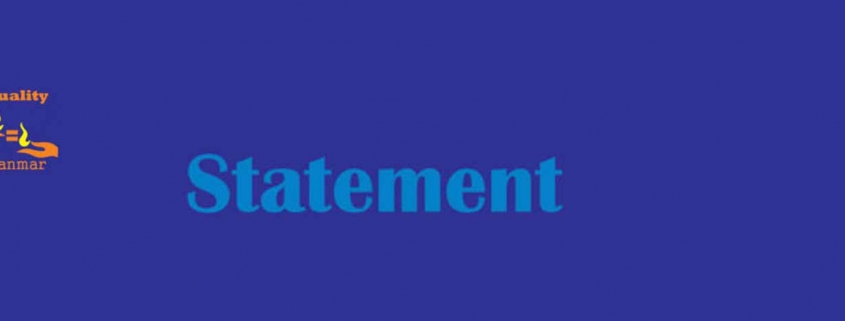“It appears that widespread and systematic violence against the Rohingya persists,” Gilmour said. “The nature of the violence has changed from the frenzied blood-letting and mass rape of last year to a lower intensity campaign of terror and forced starvation that seems to be designed to drive the remaining Rohingya from their homes and into Bangladesh.”
A number of people told Gilmour that Rohingya who try to leave their villages or even their homes are taken away and never return. One man told how his father was abducted by the Myanmar military in February. He was instructed a few days later to collect the body. He recounted that he was too afraid to ask the military what had happened to his father, but that the corpse was covered in bruises.
Another man described being tied up by Border Guard Police in his own home in January as his 17-year-old daughter was abducted. When he screamed, they pointed a gun at his head and kicked him repeatedly. When he later tried to find her, he was picked up by them and badly beaten again, this time with the butts of guns. His daughter has not been seen since 15 January.
This is a recurring theme – of women and girls abducted, never to be seen again. Their relatives fear the worst – that they were raped and killed.
“The Government of Myanmar is busy telling the world that it is ready to receive Rohingya returnees, while at the same time its forces are continuing to drive them into Bangladesh,” Gilmour said. “Safe, dignified and sustainable returns are of course impossible under current conditions. The conversation now must focus on stopping the violence in Rakhine State, ensuring accountability for the perpetrators, and the need for Myanmar to create conditions for return.”
During his visit, Gilmour interviewed recently arrived refugees in Kutupalong-Balukhali, which in the seven months since August last year has become the largest refugee camp in the world. After meeting with Bangladeshi officials, UN agencies and non-governmental organisations involved in the humanitarian response in Cox’s Bazar, he raised alarm at the prospect of the loss of life in the camps due to the imminent rains.
The Bangladeshi and international humanitarian response to the Rohingya crisis has been very impressive but the rainy season is likely to have a devastating effect on camps such as Kutupalong, a sprawling complex of shelters made of plastic sheeting and bamboo poles located across steep valleys and hillsides that have been stripped of all vegetation, including the roots.
“Having suffered so much from the man-made disaster inflicted by Myanmar, the fear is that this will be compounded by a natural disaster of heavy rainfall that will almost certainly lead to landslides and flooding. It will have the additional effect of polluting water sources through fecal sludge, causing outbreaks of cholera that could lead to many deaths,” Gilmour said.
In Dhaka, Gilmour met with senior officials of the Bangladesh Government. He commended the country’s great hospitality in providing protection and shelter.
“In welcoming such a massive influx of Rohingya refugees, Bangladesh has shown a level of generosity that is sadly lacking in many parts of the world, including in this region. This is especially true given the strain that the refugees and the humanitarian response have put on the local economy, society and environment,” Gilmour said.
He added that it was absolutely essential for international donors to demonstrate their appreciation and support to Bangladesh by making long-term commitments to assist the refugees, as well as Bangladeshi host communities, in order to share the burden.
Gilmour underlined the broad consensus that it is inconceivable to expect refugees to return to Myanmar at this point. This is based on three factors: (1) the immediate threat of almost certain killings, rape and other forms of violence; (2) in the short term, the impossibility of living there, given that all sources of food and livelihood have been destroyed or declared off-limits for most of the remaining Rohingya; and (3) in the longer term, the apparent absence of any will to address the root causes of this issue, which has resulted from decades-long policies of discrimination against the Rohingya, particularly the refusal of Myanmar authorities to recognise their right to self-identification and to grant them citizenship.
“Ultimately, the world cannot allow the authors of this brutal case of ethnic cleansing – which many believe may constitute genocide – to be rewarded. Repatriation of the Rohingya to their homes and their country will be necessary, as will accountability for the crimes against humanity that may have been committed against them,” continued Gilmour. “But while the refugees remain in Bangladesh, we call for the authorities to ensure that they can live in dignity, including by permitting access to some livelihood opportunities and by upholding the right to education of all Rohingya children.”
Gilmour expressed his gratitude to the Government of Bangladesh for its support to his mission and his deep admiration for their extraordinary response to the Rohingya in their hour of need.
ENDS
B-roll and a brief interview with Gilmour in Cox’s Bazar available on: https://owncloud.unog.ch/index.php/s/voKkNz3RkWcDFkO
Andrew Gilmour (United Kingdom) assumed his functions as UN Assistant Secretary-General for Human Rights on 1 October 2016, heading OHCHR’s Office in New York. In October 2016, Mr. Gilmour was designated by the UN Secretary-General as senior official to lead the efforts within the UN system to address intimidation and reprisals against those cooperating with the UN on human rights.
For more information, please contact:
For media enquiries, please contact
- In Bangkok: Xabier Celaya (+66 22 882 627 / Cell: +66 84 700 4671 / xabier.celaya@un.org)
- In Geneva: Ravina Shamdasani (+41 22 917 9169 / rshamdasani@ohchr.org)
- In New York: Fred Kirungi (+1 917 254 3352 / newyork@ohchr.orgThis year, 2018, is the 70th anniversary of the Universal Declaration of Human Rights adopted by the UN on 10 December 1948. The Universal Declaration – translated into a world record 500 languages – is rooted in the principle that “all human beings are born free and equal in dignity and rights.” It remains relevant to everyone, every day. In honour of the 70th anniversary of this extraordinarily influential document, and to prevent its vital principles from being eroded, we are urging people everywhere to Stand Up for Human Rights: www.standup4humanrights.org


 Equality Myanmar (EQMM) is a leading nongovernmental organization that organises a wide range of human rights education and advocacy programs, the documentation human rights violations, and provides emergency support for activists, human rights defenders, and their families. We work with a range of local civil society organizations, educators, activists, various local actors, and our programs and activities reach all states and regions in Myanmar.
Equality Myanmar (EQMM) is a leading nongovernmental organization that organises a wide range of human rights education and advocacy programs, the documentation human rights violations, and provides emergency support for activists, human rights defenders, and their families. We work with a range of local civil society organizations, educators, activists, various local actors, and our programs and activities reach all states and regions in Myanmar.
